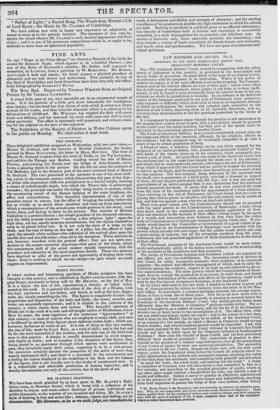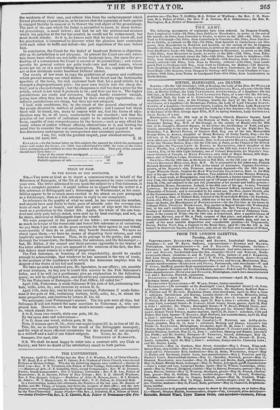LAW REFORMS AND ABUSES. No. 2.
ADDRESSED TO THE RIGHT HONOURABLE ROBERT PEEL.
INSOLVENT DEBTORS' COURT.
Sta,—The Insolvent Debtors' Court, viewed in comparison with the other courts of judicature in this country, is governed by the most simple and speedy forms of procedure. Its great defect is the want of an original power, co-extensive with the purposes of its institution. Where it has power to enforce its orders, it is the most efficient court in the kingdom. The Commis- sioners and all the inferior officers are ever at their pest ; and as every office has its full range of employment, where justice is not 'done, or is done ineffi- ciently, it will be found to arise principally from the narrow terms of the en- actment on which its jurisdiction is founded. In no instance is the defective nature of the language employed in our Acts of Parliament more unequivo- cally exposed—a difficulty which must exist so long as our legislators attempt to define by anticipation the various and complex cases submitted to the decision of our Courts, depriving them of all equitable discretion, and re- stricting their determination to the dry question prescribed by the terms of the Act.
It is repugnant to common sense (though the practice is not uncommon in the incongruoui system of our Courts) that a jurisdiction should be granted to one Court over the entire question, but that part of the details must be intrusted to the ministerial agency of another Court. The Court of Insolvent Debtors, as at present constituted, cannot seize on the estate and effects of the insolvent, although, by his schedule, offered to his creditors; but the assignees may be eventually compelled to go into a court of law to obtain possession of them.
A friend of mine, a solicitor, informs me he was lately engaged for the assignees of an insolvent debtor, who fraudulently possessed himself of the title-deeds of the estates given up to his creditors, which necessarily pre- vented a sale of them. An application was made to the Insolvent Court, but the insolvent had in the mean time handed the deeds over to his attorney ; and which fact he unscrupulously avowed, referring to the Act of Parliament, from which it appeared that the Court had no power to compel the attorney to deliver up the deeds, and the assignees were forced to go into a court of law for that purpose. The first assignee, being informed by the insolvent that the deeds were in possession of a third party, who had a demand in respect of them, did not inquire particularly into the fact ; and it was not until the appointment of an active assignee that it was discovered that the insolvent himself possessed the deeds. It seems that he had even received the rents from the time of his insolvency until the appointment of a fresh assignee. Upon referring to the Act of Parliament, the Court found, that in a case so glaring they had no power to interfere, and the only remedy was by action at law, and that too against a man who was an insolvent debtor.
There is no good reason why the Commissioners should not be invested with the same powers as the Commissioners of Bankrupts ; a body whom they much excel in the continued and indefatigable application of their time and attention to the business of their office—sitting longer by the space of a month, and transacting more business in that time than the entire body of Commissioners of Bankrupts transact during the whole year. It cer- tainly would deprive the Chancellor or Government of a great extent of pa- tronage, if four or six Commissioners of Bankrupts were invested with the powers which seventy-two now enjoy ; but the public would derive not only a great saving of expense, hut all the advantage resulting from the close, continued, and well-practised application of those functionaries to the duties of their office.
The Provisional Assignee of the Insolvent Court would be more exten- sively and practically useful, if his duties were confined to the examinership of the accounts of the insolvents and their assignees. The duties of Provisional Assignee and Examiner (which are executed by one officer) are now too multifarious. The increasing resort of debtors to this Court, for relief, necessarily possesses their assignees of an increased property; the control and effective management of which, and its early dis- tribution among the creditors, require to be kept up and enforced by isn ac- tive superintendence. The same powers which the Commissioners of Bank- rupts have to compel the production of accounts, to audit them, and finally to order the distribution of the estate and effects of the assignees, ought to be held by the Provisional Assignee or Examiner of the Insolvent Court. In my letter addressed to you last week, I alluded to the great expense and loss of time sustained by suitors in Chancery when the cause is in the Mas- ter's Office. To investigate a common mortgage-account, the average expen-
diture of time is from one to three years. Now let us see how much time is occupied, and how much expense incurred, in passing an account before the
Examiner of the Insolvent Debtors' Court, who discharges his duties more efficiently than the Masters in Chancery* perform similar duties. The ac- count is brought in, as a matter of course, and for the fee of 1/. the Examiner devotes two or three hours to the investigation of it. The officer then, with- out any additional charge, makes his report ; and in the course of a few days, that is done by the Master (for he may be so called) of the Insolvent Court, at an expense of a few pounds, on which a Master in Chancery would occupy twelve months, and several hundred pounds would be expended. I ask why the system pursued by the Insolvent Court tribunal in Lincoln's Inn Fields should not also be acted upon by the Chancery tribunal in Southampton Buildings ? How close the vicinity of these Courts, and vet how grievously different their modes of procedure ! This contrariety of practice is attri- butable to the absence of a vigilant superintendence over all the proceedings of our Courts of justice by some one universal jurisdiction. The anomalies which prevail in all our Courts, though cut down now, will rise with equal vigour, unless the Legislature bring before the Courts all subjects which re- quire adjudication in an uniform and consistent manner, attaching less value to the form than the substance, and compelling both plaintiff and defendant "to speak the truth, the whole truth, and nothing but the truth." A Judge in chambers at Common Law will often decide a case submitted to him in a few minutes, and according to the soundest principles of equity, which in any other place might exhaust a hundredfold the time, and involve a deal of doubt and difficulty. Justice is never so speedily or effectively administered as in the presence of the parties; temper and indiscretions, resulting from their eagerness to possess th Judge of their own notions, often betray
• Mr. Henry Dance is the Examiner, and was formerly an attorney in extensive prac- tice. Why are not respectable and clever attornies made Masters in Chancery I Their habits qualify them for the conduct of various and extensive details, and their acquaint- ance with the general business of life is more ,complete than that of the barristers which is rather theoretical than practical. the weakness of their case, and relieve him from the embarrassment which formal pleadings expose him to, as he knows that the ingenuity of both parties is 'engaged thereby to conceal or to thwart the real object of the proceedings. The part of the case which the Judge is permitted to know, by these techni- cal proceedings, is small indeed ; and had he not the professional acumen which his practice at the bar has created, he would not be embarrassed, but must decide blindly. As it is, he knows only that he does not know-all, and his penetration is concerned to discover what the pleaders have contended with each other to baffle and defeat-the just exposition of the case before him.
In conclusion, the Court for the Relief of Insolvent Debtors is dbjection- able as its jurisdiction is not adequate. At present the Court can only enter- tain those cases which are not liable to the bankrupt-laws, (for upon the pro- duction of a commission the Court is ousted of its jurisdiction) ; and conse- quently its general suitors are petty tradesmen and small rogues, whose assets are nit, or of a most trifling description. This, too, explains why there are so few dividends under Insolvent Debtors' estates.
Our courts of law seem to copy the gradations of expense and costliness which prevail among our retail dealers. In Bond Street and the fashionable quarters of the town, the rich customer finds that, for a good article, he is charged a disproportionate pride : the poor man travels into the cheap dis- trict, and is charged cheaply ; but the cheapness is still too dear a price for the article, which is not what it pretends to be ; and thus our law is. The higher jurisdictions are costly and extensive, though hardly extensive enough, seeing how often they may be defeated by their own petty regulations ; our inferior jurisdictions are cheap, but they are not adequate. I look with confidence, Sir, to the result of the general observation of the people directed to matters of judicial practice ; and I cannot but think there will be found, too, many to concur with me, that the forms of adju- dication may be, in all cases, conformable to one standard ; and that the practice of our courts of judicature ought to be assimilated to a common form, capable of easy comprehension by the lawyer,-such as may afford the ready means of justice without offering obstructions to it, and leaving the mind free to consider the real questions in dispute, and not exposed to end- less discussions and expense on unimportant and secondary questions.
I am, Sir, with the greatest respect, your obedient servant,
ER HATO:E.-In the former letter on this subject, the amount for which the mortgaged estate sold under the decree, viz. 1250/. was substituted for 1500/. the value of the estate when mortgaged, and omitted to state the produce of the sale. That part of the account should have been thus:-
Value of the estate when mortgaged. .. . .. 1500 Sold for under decree... .. . ... 1250
Deduet expenses of sale ........... 50
-- 1200



















 Previous page
Previous page